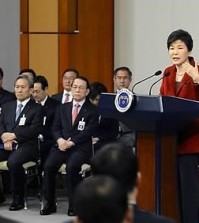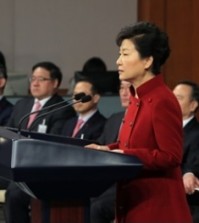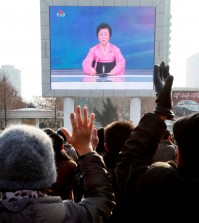- California Assembly OKs highest minimum wage in nation
- S. Korea unveils first graphic cigarette warnings
- US joins with South Korea, Japan in bid to deter North Korea
- LPGA golfer Chun In-gee finally back in action
- S. Korea won’t be top seed in final World Cup qualification round
- US men’s soccer misses 2nd straight Olympics
- US back on track in qualifying with 4-0 win over Guatemala
- High-intensity workout injuries spawn cottage industry
- CDC expands range of Zika mosquitoes into parts of Northeast
- Who knew? ‘The Walking Dead’ is helping families connect
Park taps ex-journalist as prime minister
President Park Geun-hye nominated former journalist Moon Chang-keuk as her new prime minister, Tuesday.
Lee Byung-kee, ambassador to Japan, was named to head the National Intelligence Service (NIS).
“I am humbly taking this proposal from President Park and will try to make the nation safer,” Moon said in a post-nomination speech.
He added that he would keep a low profile until his confirmation hearing.
Some experts say that he may face a tough hearing since he has never been screened for public office.
The nomination comes 13 days after Ahn Dae-hee withdrew his nomination over hefty lawyer fees.
Moon was seen as a surprise choice because he hasn’t any administrative experience, which could hinder his attempts to eliminate corruption and overhaul the nation as promised by Park.
However, he is from North Chungcheong Province, part of the central region where the ruling Saenuri Party was defeated during the June 4 local elections. It was speculated for some time that someone from this region would get the job.
“We had difficulty in searching for a nominee. As the verification was focused on personal affairs rather than philosophy, convictions and ability, candidates’ family members opposed nominations. This is why the personnel committee took more time to forward a nominee to the President,” presidential spokesman Min Kyung-wook said in a briefing.
Moon, 65, would be the first career journalist to become prime minister, if confirmed by the National Assembly.
He worked as the JoongAng Ilbo’s Washington correspondent, and political desk editor and editor-in-chief before teaching as a visiting professor in the Department of Communication at Seoul National University.
He also headed the Korea News Editors’ Association.
Since Ahn withdrew on May 28 amid controversy concerning a large sum of money he received as lawyer’s fees, President Park has been struggling to find someone with an innovative mind and ethical integrity for the government’s No. 2 post.
Moon’s choice raised speculation that the President considered the voter antipathy in the Chungcheong provinces against the ruling party in the local elections.
The regions were once regarded as home turf for the party, but the main opposition New Politics Alliance for Democracy swept all four major posts up for grabs there.
Meanwhile, Lee’s nomination as NIS chief has completed her line-up for national security along with new National Security Office chief Kim Kwan-jin.
“Lee has a wealth of knowledge on intelligence and security at home and abroad. Considering the current situation on the Korean Peninsula, he is the right person to lead NIS reform,” the presidential spokesman said.
He served as a deputy director of the Agency for National Security Planning, a forerunner of the NIS. Lee, a close aide to Park, advised her when she ran in a primary to choose a presidential candidate in 2007 and was an adviser to the Saenuri Party’s think tank.
With the dovish Lee at the helm, it remains to be seen if strained inter-Korean relations may be restored.
Critics said that his predecessor Nam Jae-joon, combined with former NSO head Kim Jang-soo, took an excessively firm stance on the North, leaving no room to mend ties with Pyongyang.
















